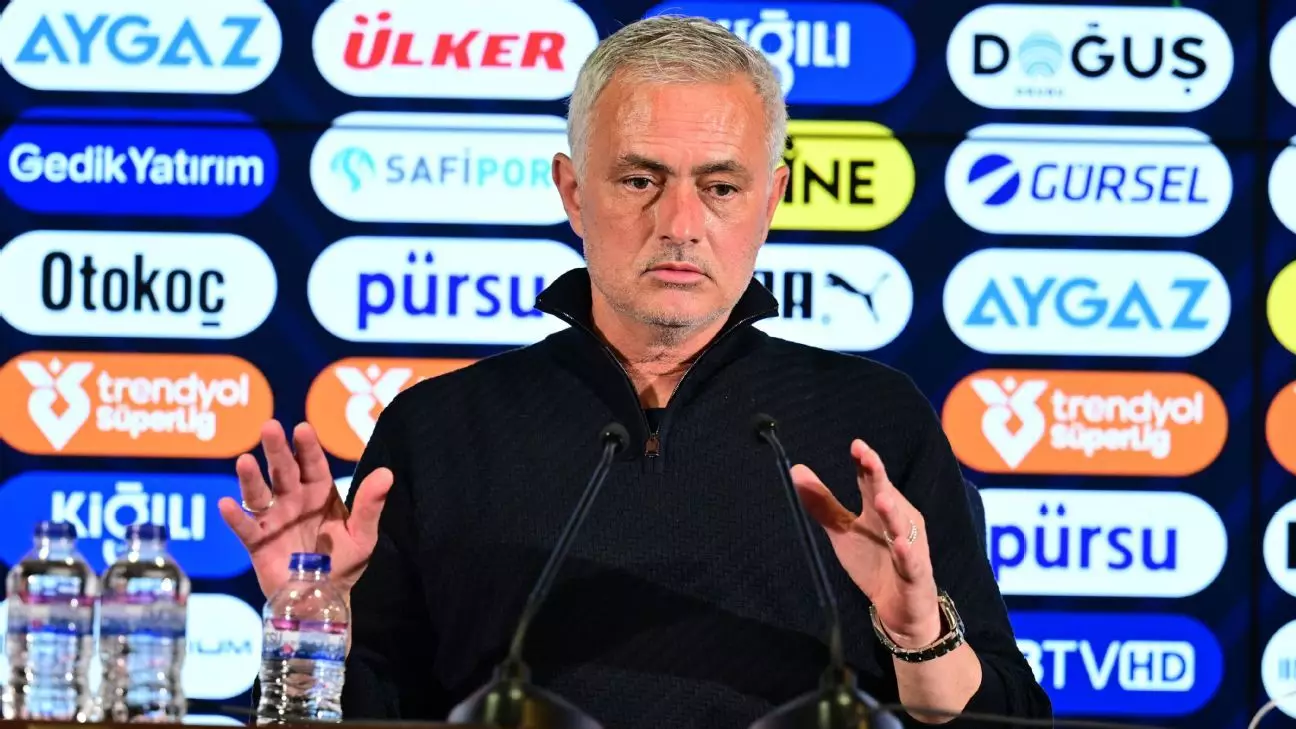In the world of football, few figures elicit as much passion as José Mourinho. Known for his tactical genius and fiery temperament, the renowned coach’s tenure at Fenerbahce is now caught in a tempest. Following a narrow 1-0 defeat to city rivals Besiktas, Fenerbahce now languishes in second place, trailing eight points behind league leaders Galatasaray with only four matches remaining in the season. Mourinho’s mission to secure a league title, which the club has not claimed in a decade, hangs in delicate balance.
His situation was further complicated during the post-match press conference. Mourinho’s reluctance to discuss his future with the club has stirred speculation and uncertainty. “I’m not speaking about next season,” he stated, emphasizing the need for internal dialogues rather than media commentary. This reticence raises eyebrows among fans eager for clarity about the strategic direction of the club. His journey, which began with high expectations, now seems shrouded in unresolved questions about commitment and continuity.
The Whisper of Special Treatment
Mourinho has never been one to shy away from controversy, and his current stance reflects his ongoing battle with the perceived injustices within the Super Lig. He has repeatedly criticized the “toxic” dynamics of Turkish football, claiming that Fenerbahce’s rivals receive preferential treatment from the officiating body. During the recent post-match talk, he declined to elaborate on Galatasaray, preferring to focus on the championship itself and consistently reiterating his concerns about the entrenched systems that dictate the course of matches.
“The power of the system is something that transcends talent,” Mourinho remarked. In doing so, he opened a window into the mindset of his players, highlighting the psychological toll that these customs can exact. It goes beyond mere frustration; it’s a gripping pressure on players who are acutely aware of their challenges. Mourinho’s focus on these external setbacks casts a shadow over his tactics and player management, creating a complex psychological environment that neither players nor coach can navigate easily.
Dialogue of Failure and Dignity
The aftermath of the derby loss has prompted reactions from fans—an expectation of accountability when results underperform. Mourinho, while gracious in accepting the criticism, firmly asserted his respect for their feelings. “I will never be critical of that,” he mused, acknowledging the culturally ingrained passion that Turkish football fans possess. His relationship with the supporters is pivotal; it’s a tightrope walk between maintaining dignity and staving off potential backlash from a fanbase that demands success.
Yet, the glaring reality remains that under Mourinho’s stewardship, Fenerbahce has failed to secure victories against its two fiercest competitors, Galatasaray and Besiktas. This streak of defeats inevitably complicates his standing among fans and management alike. The rhetoric of mutual respect with fans only goes so far if the results do not reflect the passion and pride they hold for the club.
Offering Wisdom in Turbulent Times
Interestingly, Mourinho’s post-match remarks extended beyond his own coaching predicament to touch on the situation of Ole Gunnar Solskjær, who recently assumed the managerial role at Besiktas. With genuine respect, he refrained from dispensing unsolicited advice, recognizing Solskjær’s capability and experience in the footballing ecosystem. This indicates a layer of camaraderie in the highly competitive landscape of Turkish football, as well as an understanding of the psychological challenges that accompany managerial roles in such an intense environment.
Rather than leaning into bitterness at his own misfortunes, Mourinho’s choice to uplift a fellow manager amidst his own struggles exhibits a professionalism that is often overlooked. The ability to foster constructive dialogue rather than inciting animosity showcases a depth of character that belies his fiery public persona.
José Mourinho’s current chapter at Fenerbahce is a tapestry of ambition, criticism, and the undeniable pressure of expectation in one of the world’s most passionate footballing cultures. As the clock ticks towards the end of the season, his ability to navigate the turbulent waters of rivalry, institutional pressure, and public scrutiny will likely define the legacy of his tenure at one of Turkey’s most storied clubs.

